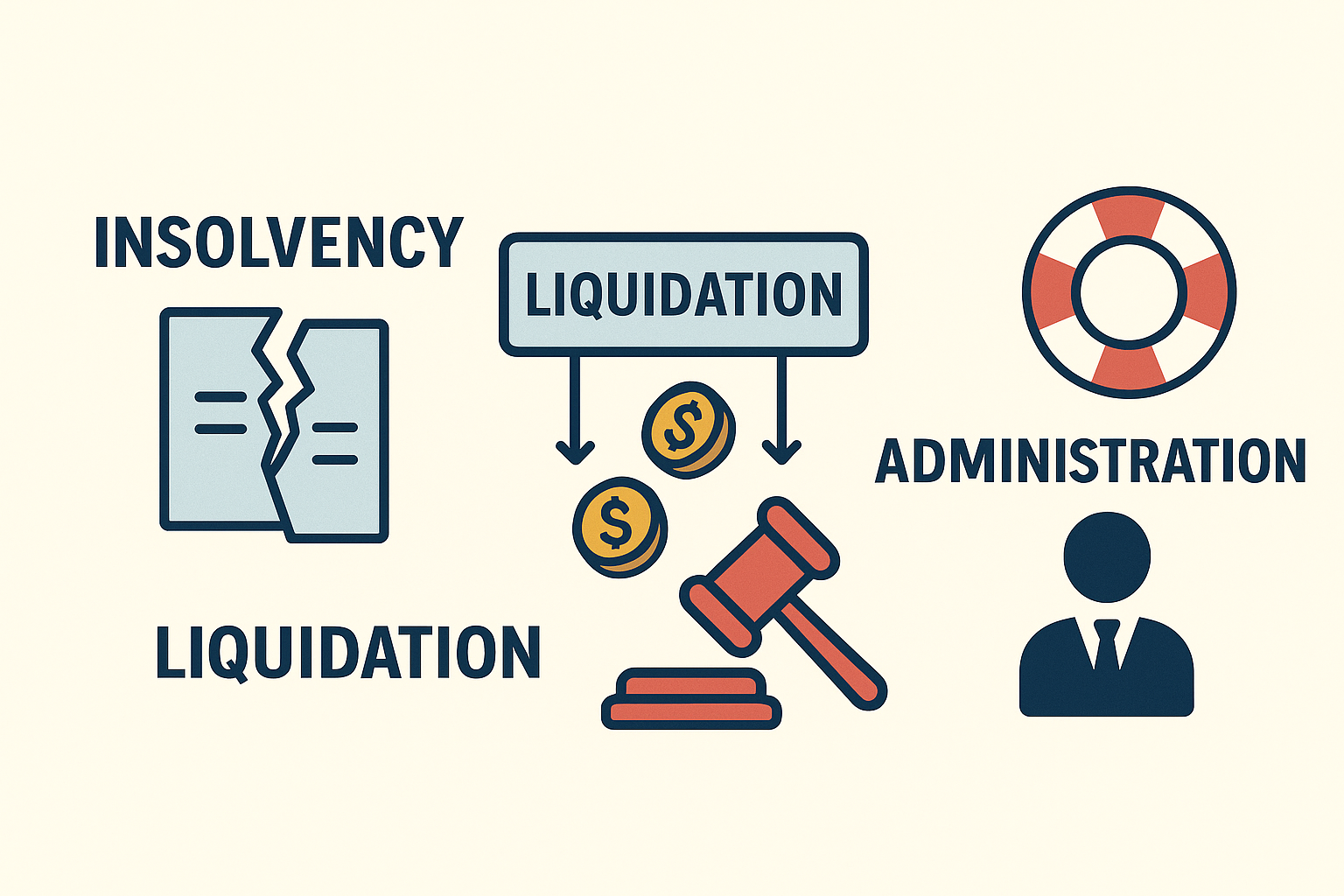
The distinction: insolvency, liquidation, bankruptcy & administration
When a business is in financial difficulties, there are a number of various options and procedures which can be followed in an attempt to solve the problem. Insolvency, liquidation, bankruptcy, and administration are all words commonly used in the situation, but it is easy to be in doubt about the distinctions.
What is Insolvency?
What is liquidation?
What is bankruptcy?
What is administration?
- What is Insolvency?
Insolvency refers to a state where a company will not be able to pay its debts as and when they are due. Insolvency may be caused by many reasons such as decreased sales, rising costs, or a sharp fall in asset value. Insolvency is an indication that a company is under financial stress and might not be sustainable as a going concern. Insolvency can progress to such serious financial issues as liquidation or bankruptcy if not addressed.
- What is liquidation?
Liquidation is the process of realizing a company's assets in terms of cash, either through selling the assets or winding up the company. Liquidation can either be voluntary, when a company ceases operations and sells off its assets, or involuntary, when a company is compelled to sell off its assets because of financial trouble, e.g., insolvency or bankruptcy. The liquidation proceeds go towards settling the firm's debts and obligations, while the remaining assets are redistributed among the shareholders or the creditors. The aim of liquidation is to close down the business and dispose of its assets in a structured and economical manner, to return as much value as possible to creditors and shareholders.
-
What is bankruptcy?
Bankruptcy is a court process that gives relief to a person or a business that is unable to pay its debts. The process is meant to give a fresh start to a person or a business that has financial problems and give their creditors an equitable and fair distribution of the assets of the bankrupt business.
In the event of bankruptcy, a trustee of the court takes possession of the property of the bankrupt firm and disposes of the assets to settle the liabilities of the firm. The assets are disposed of in a manner that yields the highest amount of money to creditors. In some jurisdictions, the assets are disposed of wholesale or in lots. The sale proceeds are used to settle the creditors, and the payment order is regulated by statute.
Bankruptcy is drawn out and complicated. One needs to appreciate the legal repercussions of bankruptcy and how it reflects on a person or a business's financial state.
-
What is administration?
Administration is a procedure where the company is in financial distress and cannot pay its debts. Administration is to secure the company and the creditors and formulate a plan which will enable the business to remain as a going concern.
In business, a court places an administrator in charge of the company and its assets. The administrator is present to review the company's financial status, handle its affairs, and negotiate with its creditors in order to find a method that will enable the company to survive. The administrator even has the power to sell portions of the company or its assets in order to settle its debts.
Administration grants a moratorium against legal action by the creditors, giving the company time to restructure and come up with a solution to the problems of finance. The objective is to come up with a method of repayment to the creditors and maintain the company in business instead of winding it up and distributing its assets under liquidation. The company can be wound up or bankrupt in the event that a solution fails to be devised.
The key differences
-
Insolvency and Liquidation
Insolvency refers to a financial condition in which a business is unable to repay due debts. Liquidation, on the other hand, means to dispose of a business's assets in order to settle its liabilities. Insolvency is an early indication that a business will be liquidated while liquidation is the final measure when the assets of the business are disposed of.
-
Liquidation and Bankruptcy
Liquidation and bankruptcy are the same in that both are the selling of a business's assets to settle its debt. Liquidation is voluntarily carried out when a business winds up its activities and sells off its assets. Bankruptcy, on the other hand, is a judicial procedure carried out when a business is unable to settle its debts.
-
Bankruptcy vs Administration
Bankruptcy is a judicial process where a court seizes the assets of a business and sells them to settle the liabilities of the company. Administration, on the other hand, is a process where an administrator takes over a business and its assets to look for a solution that will enable the business to carry on. Bankruptcy is the last resort of financial woes of a company after all others have been tried and found ineffective, whereas administration is an earlier part of the process where the aim is to ascertain what will enable the company to survive. Both processes have legal effects and outcomes. It is necessary to research the distinctions between insolvency, liquidation, bankruptcy, and administration in order to make correct decisions on what to do for a business that is experiencing financial problems.
Conclusion
In general, insolvency, liquidation, bankruptcy, and administration are distinct processes utilized in the event a business is experiencing financial trouble and unable to repay its debts.
Insolvency is a condition wherein a company cannot pay its debts when they fall due. Liquidation is the process of selling a company's assets in an attempt to recover cash with which it can settle its debts. Bankruptcy is a judicial process by which a court takes possession of a company's assets and sells them to settle its debts. At the same time, there is a process by which an administrator is appointed to take over a business and its assets to come up with a plan that will enable the business to operate. All procedure has legal implications and repercussions. It was crucial to comprehend how insolvency, liquidation, bankruptcy, and administration differ so as to make rational choices regarding the proper action for a company that is struggling. All of the procedures are intended to safeguard the business, the creditors, and the economy generally and to achieve a solution that will enable the company to continue or pay its debts in an orderly fashion.
TAXVAT is a very experienced team of professionals who can provide specialist advice to businesses of any size; get in touch with us today to learn how we can assist you!
Call: 01284 332375
Email: info@taxvatreturn.co.uk



